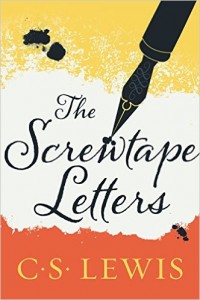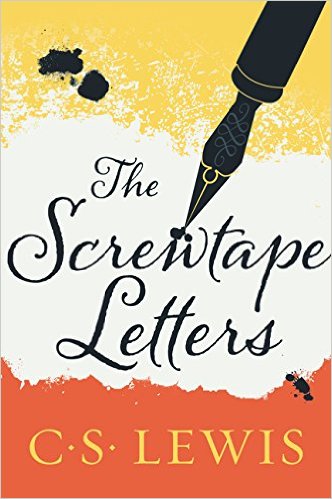 This review is quite different from the others I have written thus far. It’s actually a bit strange to not toot the horn of a book as loudly as I have previously, but I figured that in fairness I would share my likes and dislikes about this book because it’s worth it and well-deserving of respect.
This review is quite different from the others I have written thus far. It’s actually a bit strange to not toot the horn of a book as loudly as I have previously, but I figured that in fairness I would share my likes and dislikes about this book because it’s worth it and well-deserving of respect.
I recently finished The Screwtape Letters by C.S. Lewis, originally published in 1942. The satire focuses on the written correspondence of a wise, elder devil named Screwtape and his novice tempter nephew, Wormwood. The journey is set in England during World War II and the human “patient”—subject of Wormwood’s temptation efforts—is a newly converted Christian man learning to navigate between the new self and old self, the new life and old life.
As the book cover reads, “The Screwtape Letters is the most engaging account of temptation—and triumph over it—ever written.” It spans 175 pages and concludes with Preface to the additionally included Screwtape Proposes a Toast, written later as a follow-up by Lewis in 1961.
In short, I found this book to be exciting at times, hard to follow in others, and by the end a bit daunting to continue to read. In terms of its ability to produce a harvest of insightful quotes for future writing, messages and study on the subject of temptation and the devil’s methods, the book is ripe with sage wisdom. However, because of Lewis’ often breathy, witty and academic manner of constructing sentences, I realized I couldn’t always board the train of thought he was trying to get me on. I’m certain the grim subject matter was likely to blame for my lack-luster efforts in comprehension. There were parts that were clearer than others, but if I had to read a section more than three times to figure out the gist, I went on my sleepy way (mind you, I read mostly in the evenings before bed).
My lack of enthusiasm may also be in part of the season of life I am in. If you are looking for a composition of exhortation, this isn’t it. I was, however, encouraged by Lewis’ own comments about the process of writing this book (which served to validate my sentiments at the conclusion) when he wrote in the preface to Screwtape Proposes a Toast:
Though I had never written anything more easily, I never wrote with less enjoyment…But though it was easy to twist one’s mind into the diabolical attitude, it was not fun, or not for long…It almost smothered me before I was done. It would have smothered my readers if I had prolonged it.
I am glad I took the time to read this book, even if I wasn’t as riveted by it as I would have liked. There were stretches of brilliance that captivated my attention, and those are what will bring me back to this work to reference in my own writing and teaching. I would still recommend this book to those interested in reading Lewis because, as with anything, someone else may react completely differently upon opening its pages. For every season there is a flavor of books; this book as a whole just wasn’t my taste this time ’round. I much preferred it in pieces.
Even still, a few of my favorite quotes:
It’s funny how mortals always picture us as putting things into their minds: in reality our best work is done by keeping things out.
And how disastrous for us is the continual remembrance of death which war enforces. One of our best weapons, contented worldliness, is rendered useless. In wartime not even a human can believe that he is going to live forever.
Provided that meetings, pamphlets, policies, movements, causes, and crusades, matter more to him than prayers and sacraments and charity, he is ours—and the more “religious” (on those terms) the more securely ours. I could show you a pretty cageful down here.
We want cattle who can finally become food; He wants servants who can finally become sons.
He [God] wants them to learn to walk and must therefore take away His hand; and if only the will to walk is really there He is pleased even with their stumbles.
In a week or two you will be making him doubt whether the first days of his Christianity were not, perhaps, a little excessive. Talk to him about ‘moderation in all things’. If you can once get him to the point of thinking that ‘religion is all very well up to a point’, you can feel quite happy about his soul. A moderated religion is as good to us as no religion at all—and more amusing.
It does not matter how small the sins are provided that their cumulative effect is to edge the man away from the Light and out into the Nothing. Murder is no better than cards if cards can do the trick. Indeed the safest road to Hell is the gradual one—the gentle slope, soft underfoot, without sudden turnings, without milestones, without signposts.
And all the time the joke is that the word ‘Mine’ in its fully possessive sense cannot be uttered by a human being about anything. In the long run either Our Father [Satan] or the Enemy [God] will say ‘Mine’ of each thing that exists, and specially of each man. They will find out in the end, never fear, to whom their time, their souls, and their bodies really belong—certainly not to them, whatever happens.
About the Author: C.S. Lewis
Clive Staples Lewis (1898-1963) was one of the intellectual giants of the twentieth century and arguably one of the most influential writers of his day. He was a Fellow and Tutor in English Literature at Oxford University until 1954, when he was unanimously elected to the Chair of Medieval and Renaissance Literature at Cambridge University, a position he held until his retirement. He wrote more than thirty books, allowing him to reach a vast audience, and his works continue to attract thousands of new readers every year. His most distinguished and popular accomplishments include Mere Christianity,Out of the Silent Planet, The Great Divorce, The Screwtape Letters, and the universally acknowledged classics The Chronicles of Narnia. To date, the Narnia books have sold over 100 million copies and been transformed into three major motion pictures. (bio from Amazon)


